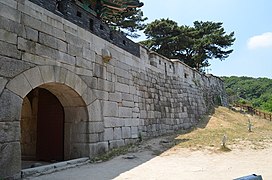Sukjeongmun

37°35′44″N 126°58′52″E / 37.59556°N 126.98111°E
| Sukjeongmun | |
 Sukjeongmun, front of gate, viewed from the north, June 2012. | |
| Korean name | |
|---|---|
| Hangul | 숙정문 |
| Hanja | |
| Revised Romanization | Sukjeongmun |
| McCune–Reischauer | Sukchŏngmun |
Sukjeongmun (Korean: 숙정문; Hanja: 肅靖門; also known as North Gate) is one of the Eight Gates of Seoul in the Fortress Wall of Seoul, South Korea, which surrounded the city in the Joseon Dynasty. The gate is also known as Bukdaemun (북대문; 北大門, “North Big Gate”). It was built north of Seoul behind Gyeongbokgung Palace. It was rarely used. It was only used in ceremonious and symbolic functions. In order to visit, identification such as a passport is required for access.[1]
History
[edit]Sukjeongmun was originally built in 1396,[2] and was originally called Sukcheongmun (肅淸門), but its name was modified slightly to its current name (肅靖門) in the early 16th century. Being situated so close to the Royal Palace of the Joseon Dynasty, it was rarely used for receiving visitors, and had more of a ceremonious function. The original wooden gatehouse over the gate was destroyed by fire, and the current gatehouse dates from 1976.
The name Sukjeongmun means literally “Rule Solemnly Gate.”[3] It is one of the Four Great Gates (사대문) in the Fortress Wall of Seoul.
Preservation
[edit]After the infiltration of North Korean agents during the Blue House Raid in 1968, both the gate and the surrounding area were closed off for security reasons. They were opened again for public touring by 2007.[4]
Image gallery
[edit]- Sukjeongmun Gate, back of gate, viewed from south
- Sukjeongmun signboard of gate, viewed from north
- Viewed from the north, showing incorporation into the Fortress Wall
- Wooden gatehouse, above the stone gate
- Door, photographed from within the gate
- Photo taken from inside gate, looking north
See also
[edit]References
[edit]- ^ "Sukjeongmun Gate The North Gate". theseoulguide. Retrieved 1 December 2014.
- ^ "Sukjeongmun Gate". Visit Korea.
- ^ "The Gates and Walls of Seoul". Korean News Today.
- ^ "Sukjeongmun Gate". Visit Korea.





